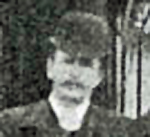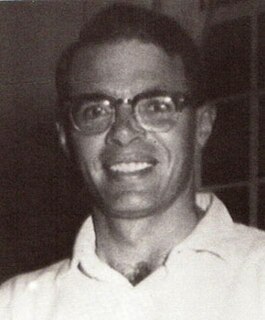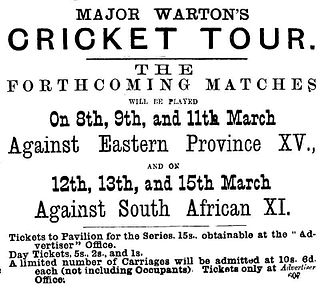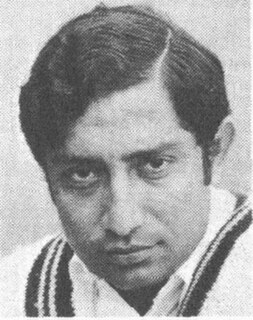Related Research Articles
Basil Lewis D'Oliveira CBE OIS was an England international cricketer of South African Cape Coloured background, whose potential selection by England for the scheduled 1968–69 tour of apartheid-era South Africa caused the D'Oliveira affair.
International cricket in South Africa between 1971 and 1981 consisted of four private tours arranged by English sports promoter Derrick Robins, two tours by a private team called the "International Wanderers", and one women's Test match. The apartheid policy followed by the South African Governments of the day meant that no Test match playing nation was willing to tour, thereby depriving world cricket of leading stars such as Graeme Pollock, Barry Richards, Clive Rice and Eddie Barlow.

The Uganda national cricket team, nicknamed the Cricket Cranes, is the men's team that represents the Republic of Uganda in international cricket. The team is organised by the Uganda Cricket Association, which has been an associate member of the International Cricket Council (ICC) since 1998.

Arnold James Fothergill was an English professional cricketer who played first-class cricket for Somerset County Cricket Club and the MCC in a career which spanned from 1870 until 1892. A left-arm fast-medium pace bowler, he appeared for England in two Test matches in 1889.
In the 1970 English cricket season, a scheduled South African tour was cancelled for political reasons. As this meant there would be no international cricket in England that season, a Rest of the World team was assembled to play a series of five-day matches against England. At the time, they were played as Test matches, but that status was later revoked by the International Cricket Conference (ICC) and they are now termed unofficial Tests, though still officially first-class matches.
Thomas William Cartwright was an English cricketer. Playing largely for Somerset and Warwickshire, he took over 1,600 wickets as a medium-pace bowler, though he began his career as a top-order batsman, and was capable enough with the bat to score seven hundreds including a double-century. He played in five Tests for England in 1964 and 1965. His withdrawal from the 1968–69 tour to South Africa led to his replacement in the touring team by Basil D'Oliveira, whose inclusion precipitated the sporting isolation of South Africa until apartheid was abolished.

Peter Laurence van der Merwe was a South African cricketer. He played in fifteen Tests from 1963 to 1967, captaining South Africa to series victories against England in 1965 and Australia in 1966-67.

When the First World War ended in November 1918, thousands of Australian servicemen were in Europe as members of the First Australian Imperial Force (AIF) and many remained until the spring of 1919. In England, a new first-class cricket season was planned, the first since 1914, and an idea that came to fruition was the formation of an Australian touring side made up of servicemen. Agreement was reached with the Australian Corps HQ in London, commanded by Field Marshal William Birdwood, 1st Baron Birdwood, and the Australian Imperial Force Touring XI was formed, initially under the captaincy of pre-war Test player Charlie Kelleway. Kelleway departed after only six matches following a dispute about the fixtures list. A players' meeting elected future Test player Herbie Collins as team captain for the remainder of the tour, despite the fact that Collins' military rank was lance corporal and there were seven officers in the party. The bulk of the team remained intact for nearly nine months from May 1919, playing 33 matches in Great Britain, ten in South Africa on their way home and then another three in Australia itself before disbanding in February 1920. Of the 46 matches, 39 are adjudged first-class and the team had only four defeats, all of these in England. The players lived on their army pay and all profits from gate money went to an AIF Sports Control Board.

The Zambia national cricket team is the team that represents the Republic of Zambia in international cricket. It is administered by the Zambia Cricket Union, which became an associate member of the International Cricket Council (ICC) in 2003. The team made its international debut in 1930, during the country's colonial period as Northern Rhodesia.

An English cricket team managed by Major R. G. Warton toured South Africa from December 1888 to March 1889. Warton was a retired British Army officer who had served on the general staff in Cape Town and was a member of the Western Province Cricket Club. He had been invited by local enthusiasts to bring a team of English first-class cricketers to the country. He negotiated with local agents called Billy Simkins and William Milton, who obtained sponsorship from Sir Donald Currie, founder of the Castle Shipping Line. They made all the arrangements while Warton travelled to England and recruited players for the team which, at the time, was known as R. G. Warton's XI.

Ivan Nicholas Johnson is a former professional, all rounder, English first-class cricketer who played for Worcestershire County Cricket Club from 1972 to 1975. He is the only Bahamian to have played professional cricket at the first-class and junior Test cricket level. He is also the only Bahamian to have worked as a staff sub-editor and journalist on newspapers in Fleet Street. In 1990 Johnson founded The Punch, a controversial Bahamian tabloid newspaper.

John William Solanky was a Tanzanian cricketer. A right-handed batsman and right-arm off spin/medium pace bowler, he played for Glamorgan County Cricket Club between 1972 and 1976.
C. D. Patel played cricket for Tanzania between 1956 and 1967 and for Zambia between 1968 and 1972. A right-handed batsman and off spin bowler, he also played first-class cricket for East Africa.
RD Patel played cricket for Tanganyika/Tanzania between 1957 and 1968, and also played three first-class matches in the 1960s.
Mohamed Asif Din is a former English cricketer who played county cricket for Warwickshire from 1981 to 1995. A right-handed batsman and occasional legbreak bowler, he is most famous for scoring a hundred and winning the man-of-the-match award in the 1993 Natwest Trophy final, widely regarded as the best domestic final.

Rev. Richard Hubert John Brooke was an English cricketer and clergyman. Brooke was a right-handed batsman who bowled right-arm medium pace. He was born in Eton, then in Buckinghamshire.
Albert Charles Taylor Geary was an English cricketer. Geary was a right-handed batsman who bowled right-arm medium-fast. He was born in East Croydon, London.
Lugogo Stadium, also known as Lugogo Cricket Oval, is a cricket ground in Kampala, Uganda. The first recorded match held on the ground came in 1957 when Kenya Asians played Sunder Cricket Club.
Narendra Patel was a Kenyan first-class cricketer.
Ramanbhai Patel was a Kenyan first-class cricketer.
References
- ↑ "First-Class Matches played by Kishore Vasani" . CricketArchive. Retrieved 21 September 2021.
- ↑ Mukherjee, Abhishek. "Basil D'Oliveira: 18 lesser-known facts". www.cricketcountry.com.
- ↑ "First-Class Matches played by Kishore Vasani" . CricketArchive. Retrieved 21 September 2021.
- ↑ "First-Class Batting and Fielding For Each Team by Kishore Vasani" . CricketArchive. Retrieved 21 September 2021.
- ↑ "First-Class Bowling For Each Team by Kishore Vasani" . CricketArchive. Retrieved 21 September 2021.